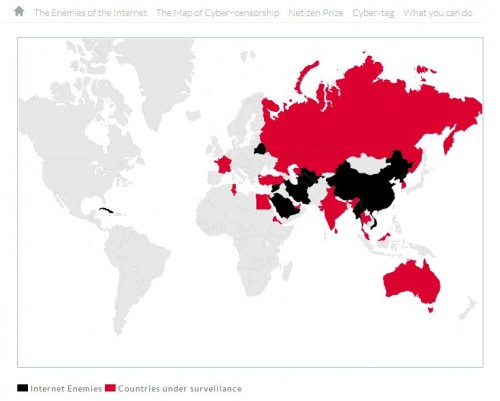Online users arrested in at least seven African nations this year
8/21/12 Update: Prominent Kenya blogger Robert Alai has been summoned by police for questioning over alleged abuse of the Kenya Information and Communication Act.
Online press freedom in Africa is certainly facing lighter headwinds than a couple of years ago. In 2010, for example, it was commonplace for cyber activists in Libya, Tunisia, and Egypt to face prison for their online activity. Although reports of netizens getting arrested in North Africa have diminished, Internet users in neighboring nations of Ethiopia, Djibouti, and presumably, Eritrea, still face illegal detention for speaking their minds. The situation is also tense in Guinea-Bissau and Mali. Opposition members in nations with looming political elections will likely face arrest as well.

Compared with the rest of the world, African nations are generally under relatively little government surveillance. Still, online censorship remains a concern. {RSF}
Still, the most alarming arrests due to online activity this year have come from Djibouti and Ethiopia – nations known to have limited press freedom. In these cases, the bloggers/journalists seem to have not necessarily broken an actual law, but have simply spoken out against the political regime.
Furthermore, in all regions of Africa (and beyond), Facebook users are facing arrest for defamatory comments. These aren’t necessarily ardent “cyber dissidents”, but ordinary people who write a hateful comment on a public Facebook wall or post a controversial image online. Such posts often violate national laws and subject the individual to arrest.
As the senior legal officer at the Kenyan National Cohesion and Integration Commission (NCIC) points out:
The law is not exhaustive on social media and it needs to be more comprehensive. When the law was written it was focused on radio and print media, then SMS; now Facebook and Twitter are a bit of a fresh area that we are expanding to.”
In 2011, we found reference to authorities arresting Facebook users in four African nations – Zimbabwe, Ethiopia, Nigeria, and Kenya. In April, we had already counted arrests of Facebook users in Kenya, Tunisia, and Malawi.
Noting the growing trend of authorities cracking down on Facebook users, we asked the question:
How many Facebook users will be arrested in Africa this year?
Two obvious reasons for the increase in arrests come to mind. More Facebook users are getting arrested because there are more Facebook users. Plus, authorities are more vigilant of using social media to monitor crime. Either way, we didn’t hear of any arrests for online activity in May or June. After a brief hiatus, however, arrests of online users have returned to the international press, with two noted in the past three weeks (one being Facebook-related).
Notable online-related arrests in 2012
- Djibouti (August): police arrest a reporter for the opposition news website La Voix de Djibouti
- Egypt (July): police arrest a minority Coptic Christian teacher who allegedly posting cartoons on Facebook that insulted Islam
- Ethiopia (July): a well-known blogger is sentenced to an 18-year prison term after being accused of participating in a terror plot
- Guinea-Bissau (April): a top blogger is detained and beaten by the military following a coup
- Tunisia (March): two youth are sentenced to seven years in prison for posting cartoons of the prophet Mohammad on Facebook
- Malawi (March): police arrest a young man who posted defamatory comments on a Facebook wall
- Kenya (March): a 21-year-old Kenyan man is arrested for calling a politician a dog on Facebook
Watch for more arrests in the coming months as 1) online users test their new medium for expression 2) nations cope with a need for updated legislation and 3) wary governments wrestle with how to police vocal Internet users.












 Twitter
Twitter Facebook
Facebook Pinterest
Pinterest
[…] for Progressive Communications about online security and censorship in digital activism. This year, at least seven online users were arrested for their internet activity, and it doesn’t seem like government monitoring of social media is going away anytime soon. In […]
[…] arrests of online users in Djibouti, Egypt, Ethiopia, Guinea-Bissau, Tunisia, Malawi, and Kenya (7 countries). Essentially no change in the number of arrests or the number of countries willing to arrest […]